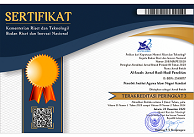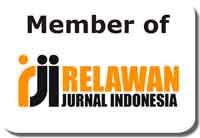Dekadensi Strategi Pembelajaran Tahfizh dan Tafsir Pondok Pesantren Tahfizh Al-Qur’an di Sulawesi Tenggara
Abstract
Keywords
Full Text:
PDFReferences
Alawiyah, Wiwi Wahid, Cara Cepat Bisa Menghafal Al-Qur’an (Yogyakarta: Diva Press, 2014)
Al-Farmāwī, ‘Al-Bidāyah Fī Al-Tafsīr Al-Mauḍū’ī Dirāsah Manḥajiyah Mauḍuiyyah’, in Diterj. Oleh Rosihan Anwar Metode Tafsir Maudu’i Dan Cara Penerapannya (Bandung: CV Pustaka Setia, 2002), p. 39
Al-Hafidz, Ahsin W, Bimbingan Praktis Menghafal Al-Qur’an. (Jakarta: Bumi Aksara, 2010)
Al-Sharba>shi>, Ah}mad Qis}s}}ah at-Tafsi>rr (Beirut: Da>r al-Jail, t.th)
Arikunto, Suharismi. Prosedur Penelitian; Suatu Pendekatan Prkatik (Jakarta: Rineka Cipta, 2013)
Baharuddin, and Esa Nur Wahyuni, Teori Belajar Dan Pembelajaran (Yogyakarta: Ar-Ruzz Media, 2008)
Dhofier, Zamakhsyari. Tradisi Pesantren (Jakarta: LP3ES, 1984)
Geertz, Clifford, ‘”The Javanese Kijaji: The Changing Role of a Cultural Broker,”’, In Comparative Studies in Society and History, Vol. II, n (1960), 160
Ibn manzūr, Lisān al-Arab, Vol. 13. Cet. I; (Beirut: Dār Sadir, t.th)
Irawan, Septianingsih, Ruhiyat dan Asep, ‘Strategi Pondok Pesantren Dalam Meningkatkan Kompetensi Program Tahfizhul Qur’an’, Tadbir: Jurnal Manajemen Da’wah, Vol. 4 (2019)
Khanifatul, Kurniawan, 'Pembelajaran Inovatif'. (Yogyakarta: Ar-Ruzz media, 2013)
Khoiruddin, Heri, Ilmu Alquran Dan Peranannya Dalam Memahami Alquran (Bandung: Fajar Media, 2016)
Kholik, Abd., Ahmad Habibullah, and & Lailatul Fitriyah, ‘Pengaruh Strategi Metode Pembelajaran Tahfizh Terhadap Karakter Dan Hafalan Santri Al-Azhar Jombang’, Education and Development, 9 (2021), no. 3
Mahfudh, Achmad Rabiuk Huda ‘Strategi Pembelajaran Penafsiran Ayat Al Qur’an Berbasis Maudhu’i Di Program Studi Ilmu Al Qur’an Dan Tafsir Fakultas Ushuluddin IAIN Kota Kediri’, Jurnal Intelektual, 9 (2019)
Mardhiyah, Ulfatun, ‘Metode Pembelajaran Tahfizh Al-Quran Di Pondok Pesantren Futuhiyyah Kabupaten Lampung Utara’ (Universitas Islam Negeri Raden Intan Lampung, 2020)
Moleong, Lexy J, Metodologi Penelitian Kualitatif (Bandung: PT. Remaja Rosdakarya, 1999)
Nasokah, Alh, and Khori Ahmad, ‘Pembelajaran Tahfizhul Qur’an Pondok Pesantren Ulumul Qur’an Kalibeber Wonosobo’, Jurnal Al-Qalam, Vol. XIII (2016)
Nasution, S, Berbagai Pendekatan Dalam Proses Belajar Dan Mengajar (Jakarta: Bumi Aksara, 2003)
Ngabdul, ‘Integrasi Program Tahfizh Dengan Sekolah Formal Di Pondok Pesantren Anak’, Al-Ta’dib, Vol. 13 (2020), No. 2
Nugroho, Puspo, ‘Pandangan Kognivisme Dan Aplikasinya Dalam Pembelajaran Pendidikan Agama Islam Anak Usia Dini’, Thufula: Jurnal Inovasi Pendidikan Agama Islam Anak Usia Dini, Vol. 3 (2015)
Nurhayati, ‘Strategi Pembelajaran Tahfizhul Qur’an DalamPembentukan Karakter Siswa Di Madrasah Ibtidaiyah Darul Hikmah Kalianda Lampung Selatan’ (PPS IAIN Metro, 2018)
Oemar, Hamalik, Metode Belajar Dan Kesulitan-Kesulitan Belajar (Bandung: Tarsito, 1983)
Ridwan, Syafruddin Amir Fauzi, and & Muhammad, ‘Problematika Pembelajaran Tahfizh Di Pondok Pesantren Tahfizh Learning Problematics at Islamic Boarding School’, Jurnal Al-Tadbir, 31 (2021), no. 2
Romadloni, Yakut Maulidia, ‘Strategi Pembelajaran Tahfizhul Qur`An Pada Siswa Kelas 1 Mi Manarul Islam Malang’ (Universiatas Muhammadiyah Malang, 2019)
Rosidin, and & Muhammad Gufron, Pendidikan Agama Islam (Malang: Edulitera, 2020)
Rosihon, Ilmu Tafsir, Cet. III (Bandung: Pustaka Sedia, 2005)
Salehudin, Ahmad, Dilema Pendidikan Pesantren Di Tengah Penetrasi Pasar Dan Pragtisme Masyarakat (Jakarta, 2008)
Sastroasmoro, Sudigdo, and Ismael Sofyan, Dasar-Dasar Metodologi Penelitian Klinis (Jakarta: Sagung Seto, 2019)
Sasongko, Agung, ‘Tren Menghafal Al-Qur’an Makin Berkembang’ [accessed 15 January 2021]
Shihab, M. Quraish, Membumikan Al-Qur’an, Cet. XIX (Jakarta: Mizan, 1999)
Shihab, M. Quraish, Membumikan Al-Quran Fungsi Dan Peran Wahyu Dalam Kehidupan Masyarakat (Bandung: Mizan, 1994)
Suryadilaga, M. Al-Fatih (dkk), Metodologi Ilmu Tafsir. Cet. III; Yogyakarta: Teras, 2010.
Tim Penyusun Kamus Pusat Bahasa, Kamus Bahasa Indonesia. (Jakarta: Pusat Bahasa, 2008)
Syah, Muhibbin, Psikologi Pendidikan Dengan Pendekatan Baru (Bandung: Remaja Rosdakarya, 2000)
Umar, ‘Implementasi Pembelajaran Tahfizh Al-Qur’an Di SMP Lukqman Hakim’, Pendidikan Islam, Vol. 6 (2017), 4
Wahid, Abdur Rahman, “Pesantren Sebagai Subkultur,” Dalam Pesantren Dan Pembaharuan (Jakarta: LP3ES, 1955)
Wijaya, Ahsin, Bimbingan Praktis Menghafal Al-Qur’an (Jakarta: Bumi Aksara, 2010)
Zalyana, ‘Perbandingan Konsep Belajar , Strategi Pembelajaran Dan Peran Guru (Perspektif Behaviorisme Dan Konstruktivisme)’, Jurnal Al-Hikmah, Vol. 13 (2016), 77
DOI: http://dx.doi.org/10.31332/ai.v0i0.5840
Copyright (c) 2023 Danial Danial, Nasri Akib

This work is licensed under a Creative Commons Attribution-NonCommercial-ShareAlike 4.0 International License.










